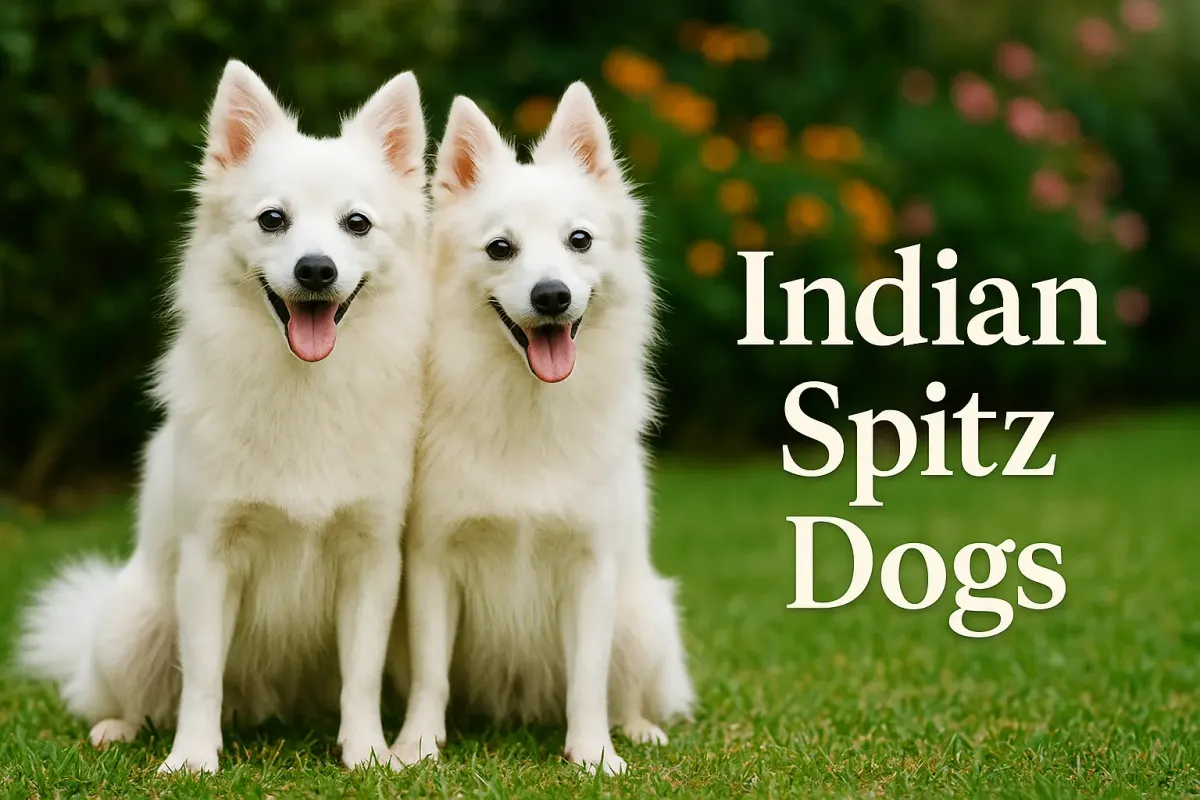Indian Spitz: Your Ultimate Guide to This Charming Breed 🐶

Indian Spitz Dogs are fluffy, affectionate, and energetic companions that have become a beloved breed across India. With their striking resemblance to the Pomeranian but at a fraction of the cost, Indian Spitz Dogs are known for their adaptability, low maintenance, and cheerful demeanor. Perfect for urban apartments or rural homes, Indian Spitz Dogs thrive in India’s diverse climates, making them a top choice for families, singles, and seniors. This comprehensive guide dives into Indian Spitz Dogs, exploring their history, characteristics, care requirements, health concerns, and tips for prospective owners. Whether you’re considering adopting Indian Spitz Dogs or already share your life with one, this guide will help you ensure they flourish. 🌟
To learn more about other popular breeds, check out Dog Breeds in India.
History and Origin of Indian Spitz Dogs 📜
Indian Spitz Dogs have a relatively recent history, emerging as a distinct breed in India during the 20th century. While their exact origins are not fully documented, Indian Spitz Dogs are believed to descend from German Spitz breeds brought to India by European settlers. Indian breeders crossed these dogs with local breeds to create a companion suited to the country’s climate and economic conditions.
- Rise to Fame: In the 1980s and 1990s, Indian Spitz Dogs gained popularity as an affordable alternative to imported breeds like the Pomeranian. Their fluffy coats and lively personalities made them a household staple.
- Indian Identity: Recognized by the Kennel Club of India (KCI), Indian Spitz Dogs are a uniquely Indian breed, though not yet acknowledged by international bodies like the American Kennel Club (AKC).
Today, Indian Spitz Dogs are cherished for their versatility, thriving in cities like Delhi and Mumbai as well as smaller towns and villages.
Characteristics of Indian Spitz Dogs 🐾
Indian Spitz Dogs are small to medium-sized dogs with a distinctive look and vibrant personality. Here’s what defines Indian Spitz Dogs:
Physical Traits
- Size: Indian Spitz Dogs weigh 5–12 kg (11–26 lbs) and stand 8–12 inches (20–30 cm) tall, with smaller and larger variants.
- Coat: A double coat with a soft, dense undercoat and a fluffy outer coat. Indian Spitz Dogs are typically white, but brown, black, or cream colors are also common.
- Face: A fox-like face with a pointed muzzle, small triangular ears, and dark, expressive eyes, giving Indian Spitz Dogs an alert and curious expression.
- Tail: A bushy, curled tail that arches over the back, adding to the charm of Indian Spitz Dogs.
Personality
- Playful and Lively: Indian Spitz Dogs are energetic and love to play, making them great for families or active owners.
- Affectionate: Indian Spitz Dogs form strong bonds with their owners, often shadowing them around the house.
- Intelligent: Quick learners, Indian Spitz Dogs excel at tricks but may show independence without consistent training.
- Vocal: Indian Spitz Dogs are alert and prone to barking, making them excellent watchdogs but requiring training to manage noise.
Temperament
Indian Spitz Dogs are adaptable, thriving in diverse environments, from bustling urban apartments to quiet rural homes. They’re friendly with children and other pets when socialized early, but their small size requires gentle handling to avoid injury.
Why Choose Indian Spitz Dogs? 🌈
Indian Spitz Dogs are a top choice for Indian pet owners for several reasons:
- Climate Resilience: Indian Spitz Dogs handle India’s hot summers and mild winters better than many foreign breeds.
- Low Maintenance: Compared to high-maintenance breeds, Indian Spitz Dogs require moderate grooming and are hardy.
- Affordability: Indian Spitz Dogs are significantly cheaper than imported breeds, making them accessible to middle-class families.
- Family-Friendly: The playful and loyal nature of Indian Spitz Dogs suits households with kids or seniors.
- Compact Size: Indian Spitz Dogs are ideal for small spaces, perfect for urban living.
Care Requirements for Indian Spitz Dogs 🧼
Caring for Indian Spitz Dogs involves meeting their physical, mental, and emotional needs. Here’s how to ensure your Indian Spitz Dogs thrive:
Grooming
The fluffy coat of Indian Spitz Dogs requires regular care but is manageable:
- Brushing: Brush 2–3 times a week to prevent matting and control shedding. Use a slicker brush for the double coat of Indian Spitz Dogs.
- Bathing: Bathe Indian Spitz Dogs every 4–6 weeks with a mild dog shampoo to maintain coat shine.
- Ear and Nail Care: Clean ears weekly and trim nails monthly to prevent infections or discomfort in Indian Spitz Dogs.
- Dental Hygiene: Brush the teeth of Indian Spitz Dogs 2–3 times a week to prevent dental issues, common in small breeds.
Exercise
Indian Spitz Dogs are moderately active and need daily activity:
- Daily Walks: 30–45 minutes of walking or playtime keeps Indian Spitz Dogs fit and happy.
- Play Sessions: Engage Indian Spitz Dogs with toys like balls or ropes for mental stimulation.
- Socialization: Regular outings to parks or dog-friendly spaces help Indian Spitz Dogs stay well-adjusted and reduce barking.
Diet and Nutrition
A balanced diet is crucial for Indian Spitz Dogs:
- Quality Food: Feed high-quality dry or wet food formulated for small to medium breeds, with protein sources like chicken or fish.
- Portion Control: Indian Spitz Dogs need ½–1 cup of food daily, split into two meals, to avoid obesity.
- Treats: Use healthy treats sparingly to prevent weight gain in Indian Spitz Dogs.
- Hydration: Ensure fresh water is always available, especially in India’s warm climate.
Training
Indian Spitz Dogs are intelligent but may test boundaries:
- Positive Reinforcement: Reward good behavior with treats and praise to train Indian Spitz Dogs.
- House Training: Be patient, as Indian Spitz Dogs may take time to master potty routines due to their small bladders.
- Bark Control: Teach “quiet” commands to manage the vocal tendencies of Indian Spitz Dogs.
- Socialization: Early exposure to people, dogs, and environments prevents shyness or aggression in Indian Spitz Dogs.
Health Concerns for Indian Spitz Dogs 🩺
Indian Spitz Dogs are generally healthy and well-suited to India’s climate, but they’re prone to certain conditions:
- Dental Issues: The small mouths of Indian Spitz Dogs are susceptible to plaque and tartar, requiring regular brushing.
- Luxating Patella: A slipping kneecap can cause limping in Indian Spitz Dogs, treatable with rest or surgery in severe cases.
- Skin Allergies: Indian Spitz Dogs may develop allergies to dust, pollen, or food, causing itching or rashes. Use hypoallergenic products.
- Obesity: Overfeeding can lead to weight gain in Indian Spitz Dogs, increasing risks of diabetes or joint problems.
- Eye Conditions: Cataracts or progressive retinal atrophy may affect older Indian Spitz Dogs, requiring vet monitoring.
Regular vet checkups, vaccinations, and flea/tick prevention ensure Indian Spitz Dogs live a healthy life, typically 12–15 years.
Cost of Owning Indian Spitz Dogs 💸
Indian Spitz Dogs are among India’s most budget-friendly breeds, with reasonable costs:
- Purchase/Adoption: An Indian Spitz Dogs puppy from a breeder costs INR 5,000–15,000 (AUD 100–300). Adoption from shelters is cheaper, around INR 1,000–3,000.
- Initial Supplies: Crate, bed, leash, and toys for Indian Spitz Dogs cost INR 2,000–5,000 (AUD 40–100).
- Food: Quality dog food for Indian Spitz Dogs costs INR 1,000–2,000/month (AUD 20–40).
- Grooming: Basic grooming for Indian Spitz Dogs costs INR 500–1,500 (AUD 10–30) every 2–3 months.
- Vet Care: Annual checkups, vaccinations, and preventives for Indian Spitz Dogs cost INR 3,000–7,000/year (AUD 60–140).
Proper budgeting ensures you can provide excellent care for Indian Spitz Dogs without financial strain.
Is an Indian Spitz Dogs Right for You? 🤔
Indian Spitz Dogs are an excellent choice if you:
- Live in a small apartment or house.
- Want an affordable, low-maintenance breed.
- Enjoy a playful, loyal companion.
- Can manage occasional barking with training.
However, Indian Spitz Dogs may not suit:
- Owners with no time for daily walks or play.
- Households with very young children, as Indian Spitz Dogs require gentle handling.
- Those seeking a silent dog, as Indian Spitz Dogs are vocal.
Tips for Choosing Indian Spitz Dogs 🐕
When selecting Indian Spitz Dogs, follow these tips:
- Reputable Breeder: Choose a breeder registered with the Kennel Club of India, providing health records for the parents of Indian Spitz Dogs.
- Health Check: Ensure the Indian Spitz Dogs puppy has bright eyes, a clean coat, and no signs of lethargy or limping.
- Temperament: Look for a curious, playful Indian Spitz Dogs puppy that interacts well with littermates.
- Adoption Option: Consider rescuing Indian Spitz Dogs from local shelters for an ethical, cost-effective choice.
Fun Facts About Indian Spitz Dogs 🎉
- Pomeranian Twin: Indian Spitz Dogs are often mistaken for Pomeranians but are larger and more affordable.
- Media Stars: Indian Spitz Dogs have appeared in Indian TV ads and films, showcasing their photogenic appeal.
- Climate Champions: Indian Spitz Dogs thrive in India’s heat and humidity, unlike many imported breeds.
- Natural Watchdogs: Despite their size, Indian Spitz Dogs are fearless, alerting owners to strangers or noises.
FAQs About Indian Spitz Dogs ❓
How much grooming do Indian Spitz Dogs need?
Indian Spitz Dogs require brushing 2–3 times a week and bathing every 4–6 weeks.
Are Indian Spitz Dogs good with kids?
Yes, Indian Spitz Dogs are friendly with children but need gentle handling due to their small size.
How much exercise do Indian Spitz Dogs need?
Indian Spitz Dogs need 30–45 minutes of daily activity, like walks or playtime.
Are Indian Spitz Dogs easy to train?
Indian Spitz Dogs are intelligent but require consistent, positive training to manage stubbornness.
What health issues affect Indian Spitz Dogs?
Indian Spitz Dogs are prone to dental issues, luxating patella, and skin allergies.
How long do Indian Spitz Dogs live?
With proper care, Indian Spitz Dogs live 12–15 years.
Conclusion: Embrace the Charm of Indian Spitz Dogs ✨
Indian Spitz Dogs are a delightful blend of fluff, loyalty, and playfulness, making them a perfect fit for Indian households. Their adaptability, affordability, and charming personality ensure Indian Spitz Dogs bring joy to families, singles, and seniors alike. By providing proper grooming, nutrition, training, and vet care, you can ensure your Indian Spitz Dogs live a long, happy life. Whether you’re drawn to their Pomeranian-like looks or their resilience in India’s climate, Indian Spitz Dogs are ready to become your loyal companions. Welcome Indian Spitz Dogs into your home and enjoy a lifetime of love and laughter! 🐶🌟





